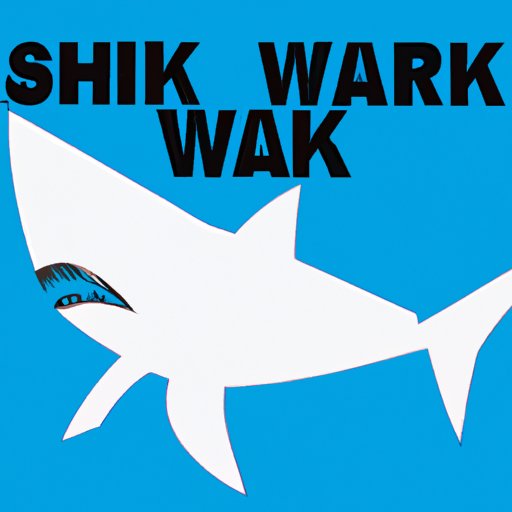Introduction
Shark Week is an annual television event that features a week-long marathon of shark-related programming. It was first introduced in 1988 and has since become a staple on the Discovery Channel. In this article, we’ll explore the history and significance of Shark Week, provide a survival guide for enjoying and learning from the event, offer insights into our fascination with sharks, provide a hands-on experience for Shark Week enthusiasts, and go behind the scenes of Shark Week production and programming.
Defining Shark Week: Exploring the History and Popularity of the Annual Television Event
Shark Week was first introduced in 1988 as a way to increase viewership during the summer months. The initial idea was to air documentaries about sharks, but it quickly became a full week of shark-related programming. Since then, Shark Week has evolved to include various formats, including documentaries, fictional stories, and live programming.
Today, Shark Week is one of the Discovery Channel’s most popular events, with millions of viewers tuning in each year. This popularity has led to partnerships with other organizations, including the Shark Research Institute and Oceana, to bring attention to shark conservation efforts.
The Ultimate Survival Guide to Shark Week: How to Enjoy and Learn from the Annual Event
With so much programming during Shark Week, it can be overwhelming to decide what to watch. Here are some tips for making the most of your Shark Week experience:
Prioritize your interests
Shark Week covers a wide range of topics, from shark attacks to shark conservation. Prioritizing your interests and choosing programming that aligns with those interests can make your viewing experience more enjoyable.
Plan your schedule
With so much programming, it’s important to plan your schedule in advance. The Discovery Channel typically releases its Shark Week schedule a few weeks before the event, allowing viewers to plan accordingly.
Engage in online discussions and activities
The Discovery Channel and other organizations often host online discussions and activities during Shark Week. Participating in these events can enhance your viewing experience and provide an opportunity to learn more about sharks and shark conservation.
Take notes and learn from the experts
Shark Week often features interviews with experts in the field of shark research and conservation. Taking notes during these segments can help you learn more about these fascinating creatures and the efforts being made to protect them.
What Shark Week Reveals About Our Fascination with Sharks: Insights and Analysis
Sharks have long been a source of fascination for humans. But what is it about these creatures that captivates us?
Psychological reasons behind our fascination with sharks
Some psychologists believe that our fascination with sharks is rooted in our innate fear of the ocean and the unknown creatures that live within it. Additionally, the danger and unpredictability associated with sharks can elicit a sense of adrenaline and excitement.
Cultural and societal influences on our fascination with sharks
Sharks have been a popular subject in pop culture for decades, from the novel “Jaws” to the movie “Finding Nemo.” Additionally, many people associate sharks with the beach and summer vacations, further cementing their cultural significance.
Positive and negative effects of Shark Week’s portrayal of sharks
Shark Week often highlights the danger and fear associated with sharks, but it can also provide an opportunity to educate viewers about the realities of these creatures. Shark Week has also been criticized for sensationalizing shark attacks and perpetuating negative stereotypes about sharks.
Dive into the Deep End: Bringing the Excitement of Shark Week to Life with a Hands-On Experience
For those who want to take their Shark Week experience to the next level, there are many ways to immerse yourself in the world of sharks:
Travel to shark-infested waters
Many tour companies offer shark diving experiences, allowing participants to see these creatures up close in their natural habitat.
Engage in shark-related activities
From snorkeling with nurse sharks to cage diving with great whites, there are many ways to get involved in shark-related activities during Shark Week.
Visit local aquariums and marine life centers
Visiting a local aquarium or marine life center can provide an opportunity to learn more about sharks and their importance in marine ecosystems.
Volunteer for shark conservation efforts
Many organizations, including the Shark Research Institute and Oceana, are dedicated to shark conservation efforts. Volunteering with these organizations can provide a hands-on experience and a chance to make a difference in the world of shark conservation.
From Jaw-dropping Footage to Celebrity Hosts: Behind the Scenes of Shark Week’s Production and Programming
Shark Week requires months of planning and preparation. Here’s a behind-the-scenes look at what goes into producing this annual event:
Overview of Shark Week’s production process
Shark Week typically takes months to plan, with production crews traveling around the world to capture footage and interview experts.
Challenges and successes of producing Shark Week
Producing Shark Week comes with its own set of challenges, including working in often-dangerous conditions and capturing high-quality footage of elusive creatures. However, the success and popularity of Shark Week make it all worth it.
Role of celebrity hosts in Shark Week
Over the years, Shark Week has featured many celebrity hosts, from actors to athletes. These hosts bring their unique perspectives and experiences to the programming, making it even more engaging for viewers.
Conclusion
Shark Week is an annual event that has captivated audiences for over three decades. Its popularity has led to increased attention and support for shark conservation efforts, making it an important event for anyone who cares about the ocean and its inhabitants. By following our survival guide, engaging in hands-on experiences, and learning from the experts, anyone can make the most of their Shark Week experience.
Call to Action: If you’re interested in supporting shark conservation efforts, consider volunteering with organizations such as the Shark Research Institute or Oceana.
